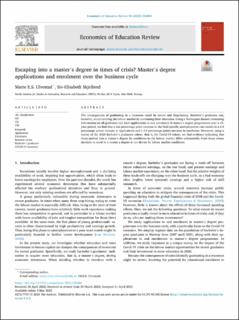| dc.contributor.author | Ulvestad, Marte E.S. | |
| dc.contributor.author | Skjelbred, Siv-Elisabeth | |
| dc.date.accessioned | 2023-05-10T08:28:49Z | |
| dc.date.available | 2023-05-10T08:28:49Z | |
| dc.date.created | 2023-05-08T14:24:43Z | |
| dc.date.issued | 2023 | |
| dc.identifier.issn | 0272-7757 | |
| dc.identifier.uri | https://hdl.handle.net/11250/3067429 | |
| dc.description.abstract | The consequences of graduating in a recession could be severe and long-lasting. Bachelor's graduates can, however, avoid entering the labour market by continuing their education. Using a Norwegian dataset containing information on all graduates and their applications to and enrolment in master's degree programmes over a 15-year period, we find that a one percentage point increase in the field-specific unemployment rate results in a 6.5 percentage points increase in applications and a 3.9 percentage points increase in enrolment. Moreover, using a survey of the 2020 bachelor's graduates cohort, that is, the Covid-19 cohort, we find evidence indicating that those pushed into a master's degree by conditions in the labour market differ substantially from those whose decision to enrol in a master's degree is not driven by labour market conditions. | |
| dc.language.iso | eng | |
| dc.title | Escaping into a master's degree in times of crisis? Master's degree applications and enrolment over the business cycle | |
| dc.title.alternative | Escaping into a master's degree in times of crisis? Master's degree applications and enrolment over the business cycle | |
| dc.type | Peer reviewed | |
| dc.type | Journal article | |
| dc.description.version | publishedVersion | |
| dc.source.journal | Economics of Education Review | |
| dc.identifier.doi | https://doi.org/10.1016/j.econedurev.2023.102404 | |
| dc.identifier.cristin | 2146187 | |
| cristin.ispublished | true | |
| cristin.fulltext | original | |
| cristin.qualitycode | 2 | |
